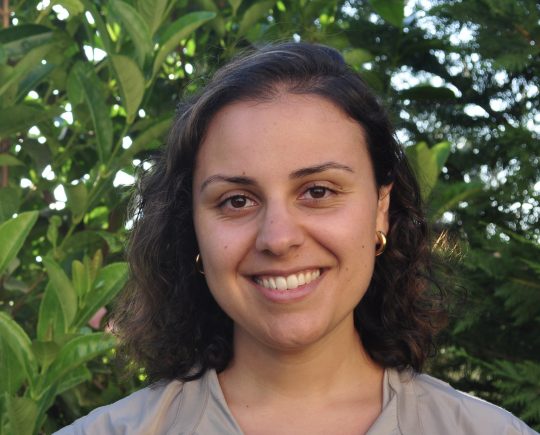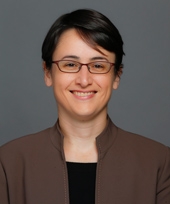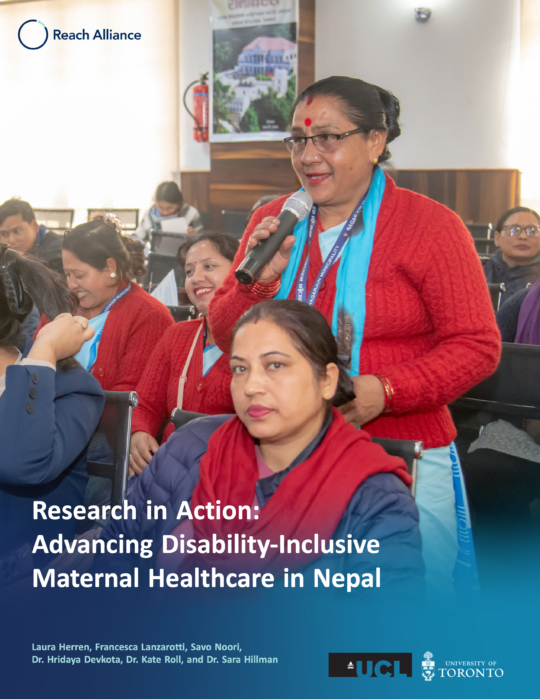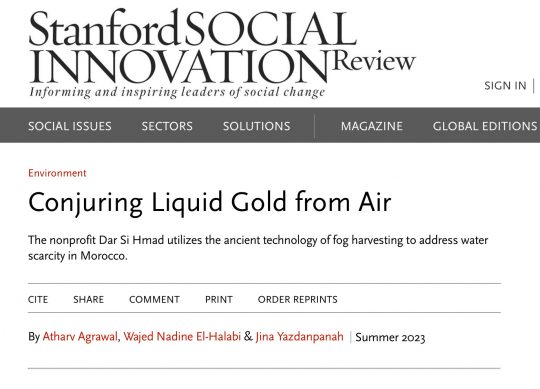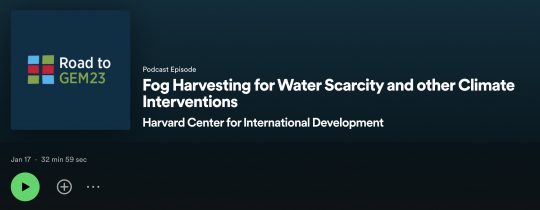Executive Summary
An estimated third of the global population experiences a scarcity of fresh water, partly because of changing climate and rainfall patterns across the globe. Alternative, sustainable water sources are crucial, especially for socially and geographically isolated communities, who are often most vulnerable to this crisis. Methods such as fog harvesting have been successful in providing potable water to remote populations by using green technology and thus promoting sustainable development.
Dar Si Hmad (DSH) is a nonprofit organization located in the Moroccan cities of Sidi Ifni and Agadir. Their mission is to “promote local culture and create sustainable initiatives through education and the integration and use of scientific ingenuity with the communities of Southwest Morocco.” Their major initiative is a fog-harvesting project that delivers clean water to the landlocked rural communities of southern Morocco who previously did not have access to potable water. Today, DSH’s fog- harvesting project is the world’s largest fog water collection and distribution system and the only one located in North Africa. They have also established many other programs for the socioeconomic development of the populace they serve.
Their success can be attributed to their slow expansion, their institutional adaptability, and innovative, self-reinforcing strategies to overcome social and cultural resistance. Despite their successes, DSH must still grapple with the difficult questions of sustaining their success in an economically, socially, and environmentally changing world.
Context: Desertification and Prospects of Cultural Loss
Morocco is one of many nations facing severe threats from recent climate change. With regions of extreme aridity, average yearly temperature increases of 1.8 degrees, and a 30 per cent decline in rainfall, the country is bound to experience notable water shortages. The impact of climate change will be particularly severe in certain areas like the arid Ifini region, located approximately 35 kilometres from the Atlantic coast in the country’s southwest. While Ifini has experienced a drought cycle yearly since the 1960s, the area still has not recovered from a 1986 drought. It continues to experience less rainfall and greater desertification.1
One of two major mountain ranges in the country, the Anti-Atlas Mountains, are in this region, lying on the edge of the Sahara. The area is characterized by low rainfall and limited freshwater resources — a situation that has been aggravated by global climate change trends. In particular, the foothills of the Anti-Atlas Mountains experience less than 150 millimetres (6 inches) of rainfall annually, a situation that is exacerbated by hot, dry winds that blow from the Sahara and lead to frequent occurrences of drought.2
The mountains are inhabited by Amazigh communities, which are heavily dependent on fishing, agriculture, and livestock farming, the latter two requiring a significant amount of water. Historically they have obtained potable water from public wells and private family cisterns that collect rainfall water. During times of drought, villagers are forced to purchase water at high prices or travel greater distances to find it. Well water is less than ideal because it has high levels of chemicals.
Water stress and water poverty, combined with a lack of employment opportunities, low-yielding land, and climate-induced desertification, have resulted in people’s wide-scale migration from rural to urban areas and a subsequent weakening of social structures, community instability, and depopulation. This migration threatens the very socio-cultural fabric that holds the Amazigh communities together and affects their capacity to pass down cultural practices such as their traditional language among those who live in urban areas.
Urban migration has also affected the region’s environmental sustainability because a significant portion of the community’s labour and agricultural force is absent for the majority of the year, and women become primarily responsible to meet their households’ needs. Specifically, the absence of a significant amount of the population capable of agricultural labour (along with water scarcity) has led to a failure to adequately maintain the flora, such as Argan trees, which play a key role in preventing the further desertification of a region already located on the edge of the Sahara Desert
Hardest to Reach
The geographic condition of this natural landscape results in environmental conditions that pose a significant challenge to the Imazighen (plural of Amazigh). The Imazighen (meaning “free people”) are the Indigenous people of North Africa, commonly known to the West as Berbers (though this is generally considered to be a derogatory exonym implying barbarism). By the first millennium BCE, they were a well-established group throughout North Africa who witnessed the passing of various civilizations and the Arab expansion. The Arabs had a significant influence on the region by introducing Islam, the main religion of the Imazighen today. The Imazighen’s language, Tamazight, is still spoken across their traditional homeland, Tamazgha, an area that stretches across the borders of the modern nation-states of Morocco, Algeria, Tunisia, Libya, Egypt, Mauritania, Mali, Niger, and Burkina Faso. The Imazighen are estimated at around 30 million inhabitants, though the largest concentration (50% of all Imazighen) can be found in Morocco, making up between 40 and 60 per cent of the local population.3
A significant percentage of Morocco’s rural population identifies as Amazigh, especially the poor and those in the Anti-Atlas Mountains.4 5 6
In addition to being historically isolated from legal, educational, and socio-cultural contexts, the Imazighen of the Anti-Atlas Mountains in Ait Baamrane are geographically hard to reach. The government provides only minimal resources and basic amenities, leaving them deprived of public services such as running water, schools, and occupational and financial opportunities. In combination with the water stress and low-yielding land, the lack of state presence has caused the population to be extremely marginalized. Many men are forced to leave their villages for extended periods of time to provide for their families, working in urban centres such as Casablanca and Rabat. Women stay in the region to maintain the land and meet the households’ day-to-day needs. These responsibilities compromise the women’s education and overall sense of community involvement and empowerment, including a reduced capacity to engage in cultural practices and less time spent speaking the traditional Tamazight language.
How Fog Harvesting Works
Despite its relative aridity, the Ifini region has a significant amount of seasonal humidity and clouds and fog surround the mountains for about six months of the year. The summit of Mount Boutmezguida, one of the mountains in the Anti-Atlas Mountain chain at an altitude of 1,225 metres, approximately 20 kilometres inland from the capital of Sidi Ifini, is where Dar Si Hmad’s (DSH) fog-harvesting journey began.
Fog Water Harvesting
Fog is a natural part of the global water cycle and originates from water lost through evapotranspiration which creates humid air. There are two main types of fog: advection fog (fog formed over oceans, resulting in clouds that get blown inland) and radiation fog (which occurs overnight as a result of the condensation of water vapor above cooler air). Both types require a drop in temperature below the dew point, which is why mountainous areas near the coast are ideal for fog formation. Harvesting water from fog (either by collecting water that dripped under trees or by constructing structures for the purpose) is an ancient practice evident in the Canary Islands, Oman, the desert areas of the Mediterranean, and South America.7 8
Although some communities continue to collect fog and dew according to local traditions often rooted in ancient practices, the most common fog-collection method today involves the use of devices called large fog collectors (LFCs). This method requires a substantial amount of fog and involves the use of mesh nets (about 40 to 48 square metres attached to a sturdy frame) that collect water as fog passes through them. The water is then sent to a reservoir such as a cistern or gutter. The amount of water collected largely depends on the material of the nets, as well as other factors like wind speed. Multiple collectors are usually placed within one collection
Figure 1. A traditional Amazigh produce market.site to provide the desired amount of water. The number, size, and type of collectors employed depend on the fog characteristics (frequency, duration, thickness), climate and topography, water demand, and the financial and human capacity of a particular location.
The technology is relatively inexpensive, costing between USD 1,000 and USD 2,400 per mesh net with a lifetime of 5 to 20 years. It is simple to use but requires periodic maintenance (such as repairing ripped mesh, ensuring the mesh is clean, and monitoring/repairing the reservoir and distribution systems) to remain in operation. Despite this technology’s low cost and simplicity of operation and maintenance, low-income communities generally rely on grants or subsidies at the initial phase of implementation, largely for the purchase of the fog nets.
The water collected from fog collectors tends to contain a greater number of soluble particles compared to other water sources such as rainfall. This often results in the need for additional treatment such as flushing the first batch of water or mineralization of the fog water, that is, fortifying fog water with essential minerals. These additional treatments produce healthy drinking water that meets WHO standards. Harvested fog water has also been used for other purposes, such as agriculture or reforestation.
Dar Si Hmad
Dar Si Hmad, a nonprofit organization located in the cities of Sidi Ifni and Agadir, aims to “promote local culture and create sustainable initiatives through education and the integration and use of scientific ingenuity with the communities of Southwest Morocco.” Their major initiative is their fog-harvesting project, delivering clean water to the landlocked rural communities of southern Morocco who previously did not have access to potable water. Given the substantial occurrence of fog atop the Anti- Atlas Mountains of Ait Baamrane, which lasts from about June until September, fog harvesting became an alternative source of fresh water for the communities in this region. DSH currently serves 16 villages and plans to expand to 12 more villages within Ait Baamrane.
DSH installs their fog-harvesting units 1,200 metres above sea level, at the summit of Mount Boutmezguida, at an intersection with the Sahara winds. They currently have installed 1,700 square metres of nets that have a honeycomb style of netting. When fog is trapped by the nets, water sticks to the netting and runs to the bottom of the netting. It then gets collected in a gutter and then funnelled into an underground container. From there it is sent to a mixing reservoir, where the water is pumped via photovoltaic power to be mixed with minerals. The mineralized water is first piped to a village where smaller pipes then veer from the main piping system toward individual households. To receive water from
Figure 2. Map of Cloudfisher units.DSH, households pay a combination of a base fee and a per-use fee which totals an average of 45 dirham/per month (approximately 5.5 USD). Once the water is accessed at the household level, it can be used for drinking, cleaning, and/or agricultural purposes.
DSH’s fog-harvesting project is the world’s largest fog water collection and distribution system and the only one located in North Africa. Recorded benefits to these communities include the development of a sustainable alternative water supply, freshwater access in homes and schools, lower incidents of water-borne diseases, increased livelihood opportunities, reduced water-gathering time, girls’ increased attendance in schools, increased employment, increased water supply for agriculture and reforestation, decreased need to sell animals because of limited water, and increased participation of women in natural resource management.9
In addition to the fog-collection project, DSH has created several subprojects, including adult literacy trainings, a water school, WASH (water, sanitation, and health) trainings, a reforestation program, and the installation of eco-friendly hygienic toilets. A significant development was the introduction of information and communication technology (ICT) via mobile phones, personal computers, tablets, and custom software designed for monolingual and low- literate Amazigh women to report on the water distribution system’s conditions.
This project has also led to the establishment of a research centre dedicated to the study of fog and environmental sustainability. Research partners include climate scientists and meteorologists from the University of La Laguna in the Canary Islands, Spain; Germany’s Wasserstiftung Water Foundation and Research Institute; the Department of Ecoclimatology at Technische Universität München (TUM); and the Water Institute in Rabat, Morocco. Other partners include student researchers and engineers from the University of Colorado’s ATLAS Institute, the Worcester Polytechnic Institute in Massachusetts, and the Tifawin Institute in Colorado. DSH receives further public and private financial support from USAID, the Munich Re Foundation, and other donors in Morocco, Spain, Germany, and the United States.
Although fog-harvesting technology has been implemented in other geographic regions where fog is present in larger amounts and for longer periods of time (such as in northern Chile), DSH has experienced the most success. Given that DSH has continued to operate and expand for over 10 years and is currently the world’s largest fog-collection project, it serves as a highly valuable model to understand how development technologies can be aligned with concerns about climate change. It is also useful to analyze how the use of climate change mitigation technologies can be aligned with traditional knowledge and become socially, politically, and economically sustainable. It also represents progress made in the following Sustainable Development Goals in Morocco: 1 (No Poverty), 6 (Clean Water and Sanitation), and 11 (Sustainable Cities and Communities).
Proposed Framework of Sustainability
The success or failure of a technological intervention is largely determined by social, cultural, and institutional factors. In other words, the central question is not whether the technology works, but whether it is accepted, embraced, and adopted by the communities that can benefit from it. One of the most important dimensions of success is the sustainability of an intervention, which can be defined as “project-initiated goods and services still being delivered and maintained some years past the termination of donor resources, the continuation of local action stimulated by the project, and the generation of other services and initiatives as a result of project-built capacity.”10
There are four primary phases in the path to sustainability: household adoption, community acceptance, community adoption, and expansion. Most importantly, moving from one phase to another requires an increasing level of trust.
Development literature defines adoption as “the individual’s decision whether to integrate an innovation into his or her life.”11
Figure 3. Proposed framework of sustainability.lives. This first phase is relevant in only those instances where households can individually elect to partake in the intervention or withdraw from it.
Household adoption sets the stage for the second phase, community acceptance, which is characterized by decreasing levels of resistance and skepticism toward the intervention. For instance, the adoption of the intervention by influential community members could create an incentive for the larger populace to, at minimum, entertain the notion of the intervention (e.g., accepting its presence in the community), even if they are not entirely convinced of its benefits or willing to integrate it in their own lives yet. The decrease in skepticism toward the intervention is often associated with increased trust.
As the level of trust reaches a certain threshold, the larger population finally begins to adopt the intervention themselves. This phase is called community adoption. If the critical mass of participation in the intervention reaches certain threshold levels, then it can be expanded to other locales. This initiates the fourth phase of the framework, expansion. As the intervention continues to grow –– both geographically, in number of benefactors reached, and in types of services offered –– maintenance is key. Maintenance ensures the intervention is held up to the same standard as before –– if not higher –– as the intervention’s reach grows. As Figure 3 illustrates, there is a feedback loop between expansion and sustainability –– maintenance is integral every time an intervention seeks to expand the ambit of its operations from an existing state of sustainability. DSH navigated this path to create a sustainable intervention.
The Importance of Strategic Implementation
DSH’s success can be attributed to the implementation strategies adopted along the many phases of the project rather than solely to the presence of fog, the technology, or the influence and support of external funding bodies. Three distinct dimensions characterize DSH’s strategies, and subsequently their success: (1) a slow expansion model of implementation, allowing for time and space to not only understand but also respond to changing conditions; (2) institutional adaptability, which is related to their focus on problem solving, rather than solely on technology; and (3) self-reinforcing strategies to overcome social and cultural resistance, culminating in helping communities learn how to adequately manage and benefit from easy access to higher levels of water.
Slow Expansion Strategy
DSH adopted a slow expansion model for growth. Before the pilot of the fog-harvesting project in 2011, they engaged in a five-year-long process of due diligence, consultation, and experimentation to assess not just the technological feasibility of the project, but also to ensure that they had generated sufficient buy-in from the intervention’s direct benefactors, the villagers. This slow approach allowed for a natural progression to not only comprehensively understand people’s needs but also to respond to challenges sustainably. This strategy also contributed to adaptability. It is important to adapt to the current environment and circumstances as well as to changing conditions over time. Three instances exemplify how slow expansion positively influenced DSH’s implementation.
In 2011, DSH launched its first pilot phase, utilizing a technological design developed by the Canadian nongovernmental organization (NGO) FogQuest, to determine the technology’s suitability in southwest Morocco, and the water yield from the fog collectors. From 2011 to 2014, DSH further explored the hydraulic potential of the mesh, and began to install netting atop Mount Boutmezguida along with the piping for the distribution system. DSH discovered they could harvest 10 litres of water per square metre of netting, compared to the global average at the time of five litres per square metre. During this period, they installed 600 square metres of polypropylene mesh. In 2015, the water from the nets became accessible for drinking and flowed into individual households. Then, CloudFishers, a new generation of fog collectors manufactured in Germany, were introduced in 2017. These were able to collect 20 litres of water per square metre of netting and required less maintenance. Piping connected the system to 16 villages, serving 150 households.12
Figure 4. Water taps installed by Dar Si Hmad in villages, providing access to potable fog water.Once the system proved functional, DSH slowly expanded the system to new villages. Originally, the pilot started by connecting the furthest villages to the piping system to ensure the water pressure would be operational at such a distance. This process required initial investigation and fine tuning. Once its functionality was verified, DSH was then able to take a more strategic approach toward deciding which villages to expand to. The decision process was primarily based on the topography of the village to determine its physical suitability. Then, other factors were taken into consideration including the number of homes, number of inhabitants, villager willingness to contribute financially to build the nets, and logistical and cost feasibility to implement. DSH was able to combine the geographical, economic, and social considerations involved in the expansion of the project as a result of first concretely establishing its technological specifications and then carrying out implementation incrementally over time.
Second, DSH’s slow expansion strategy allowed for enhanced opportunities to overcome initial resistance to the project. The villagers’ initial reception to the idea of fog harvesting was not entirely positive –– there was skepticism about its possibility, a distrust in technology they did not understand, as well as concerns over the possible alterations it might bring to sociocultural dynamics. DSH’s founder, Dr. Derham, who was an influential member of these villages himself, addressed these initial reservations by persistently engaging with the villagers to address their concerns. Over time, as the project progressed, DSH created a series of engagement and educational opportunities with the same purpose. Eventually, DSH was able to implement the pilot. This did not eliminate all skepticism though –– that was addressed only when the project actually delivered what it promised. Through the use of a slow expansion model, DSH was able to obtain a level of acceptance among community members over time which, at first, provided DSH with the opportunity to showcase the project, and then let villagers witness directly the project’s benefits and assess it themselves.
Third, the slow expansion seems also to be an important factor in one of DSH’s most noteworthy successes: catalyzing female empowerment. The project has elements that are vastly different from the sociocultural norms that people are accustomed to, particularly gender dynamics. DSH’s hybrid approach embraced customary rules and norms but in a way that also simultaneously promoted change. To successfully implement this hybrid approach, DSH created an environment where village members were given time and space to come around to proposed ideas. This allowed for slow but steady cultural change that was ultimately sustainable because of the pace at which it occurred. DSH has employed this process of slow expansion in every new dimension of the project that it has undertaken since.
Institutional Adaptability
A second factor that contributed to DSH’s success is its ability to adapt as an institution. DSH modified its plans multiple times to address people’s needs and concerns, the region’s physical and geographical limitations, as well as demands and restrictions imposed by governmental institutions, funders, partners, and collaborators. Its adaptability has manifested itself in a number of different dimensions: (1) not being set on a particular technological solution (being open to replacing their initial choice with a technology that was better suited to the region); (2) being flexible regarding the kind of water provision services that would be offered to villagers (from collective to individual); and (3) strategically addressing multiple logistical barriers, such as a migrating population.
Adaptability has characterized the project’s entire duration and continues to inform DSH’s operations to this day. As a result, DSH has been able to accommodate changing conditions and faced challenges with flexibility and malleability, whether they are presented at the onset (like the community’s resistance before nets were built) or over the course of implementation (such as nets being ripped by strong winds in the mountains and requiring technological adaptations).
Adaptability serves two functions in ensuring DSH’s success: it helps them overcome barriers to implementation (technological, social, or geographical) and, perhaps most importantly, makes them open to search for the strategy that is most likely to be sustainable.
Adaptability to Community Preferences
During the pilot phase of the project, DSH offered access to water to the entire community through a tap located at the centre of the village. However, the community boycotted the communal provision system. Inhabitants would manipulate the system so that it would always be flowing, wasting water. (DSH lost approximately 34,000 litres of water because of the boycott.) DSH then piped water to individual households.
Figure 5. Dar Si Hmad’s fog nets, on the top of Mount Boutmezguida.Logistical Adaptability
DSH also faced logistical barriers to expanding the water piping systems. Villages are sparsely distributed in the region. Being distant from one another, they are also at varying distances from the fog catchers. This affected the costs of servicing different villages so topography became one of the primary determinants of the economic viability of servicing a particular village. Sometimes villages with very few households or that were not favourably located with respect to the fog catchers were unable to partake in the project’s benefits. While the implementation plan was designed to consider the externally imposed geographical and topographical limitations associated with the location of villages and fog- collecting systems, some villagers challenged these decisions, believing that DSH was favouring some villages over others. DSH continued to engage with villagers with transparency and honesty to explain its predicament with respect to a project’s feasibility while continuing to expand their services to more villages.
Determining the economic viability of service provision was further complicated by the migration in these communities. Because these villages are well below the poverty line, even with access to a safe water source through DSH’s support, some families do not have sufficient resources for their livelihood. Therefore, although DSH has installed the system (i.e., piping) connecting certain households, in certain cases they remain unused because families have migrated away. Some villages have less than 25 per cent of their houses inhabited. DSH has tried to address this challenge by increasing economic opportunities in the region through remunerated initiatives, particularly the fog-harvesting and a farming project. These initiatives have helped mitigate the urban exodus.
Technological Adaptability
Given the region’s geography, DSH installed the fog catchers at high elevations (the peak of Mount Boutmezguida), the only location with an adequate amount of fog. Strong winds reaching over 100 kilometres per hour affected these sites. Between 2011 and 2014, the initial fog nets from Canadian NGO Fogquest were being repeatedly ripped. Constantly repairing or replacing the nets was not a sustainable solution. In 2016, a major wind gush, with speeds over 126 kilometres per hour, destroyed everything.
DSH started looking for a new, long-term solution. Supported by the Munich Re Foundation, and aware of the challenges faced by DSH, the Water Foundation developed a newer fog catcher technology called the CloudFisher, which was more appropriate to the Moroccan context because the fog catchers were smaller and significantly more resilient to strong winds. With the new netting, DSH was able to collect 20 litres of water per square metre of netting, doubling their previous capacity of 10 litres per square metre.
Selective Adaptability to External Support
DSH’s project has received support –– financial and otherwise –– from external stakeholders. As the development literature indicates, external support often comes with many conditions, based on the agendas of donors and funders. Sometimes, these conditions may be in tension with the preferences of the organization implementing the project or of the beneficiaries. In some cases, such tensions can hinder the intervention’s success. But in other cases, the external stakeholders’ priorities can be directly aligned with those of the organizations they support. The nature of the relationship between an organization and their stakeholders is an unpredictable variable. However, strategic alignment and compatibility between an organization and their stakeholders can significantly influence an organization’s capacity for selective adaptability and reduce potential tensions.
Although the netting that Fogquest originally implemented was constantly damaged by the strong winds and required a lot of maintenance, the organization was not open to changing its technology to adapt it to the region’s particular needs. They establish fog-harvesting projects using a very specific technology that they have designed in a standardized manner. As a result of Fogquest’s lack of flexibility, DSH decided to procure technology from another organization.
DSH’s collaboration with the Munich Re Foundation resulted in an organization-funder relationship that allowed for DSH to have increased flexibility in the allocation of their funding. The Munich Re Foundation advanced the fog net technology being employed by DSH by involving the Water Foundation and encouraging iterative development, leading to the currently used CloudFisher technology. This relationship was paramount to DSH’s expansion and sustained success — not only in the form of funding but also in their investments into valuable research and development with the intention of tailoring the intervention to villagers’ specific needs.
Because of their strategic alignment, DSH has positively benefitted from the relationship with Munich Re. The German Ministry for Economic Development and Cooperation and Munich Re Foundation played a crucial role in the establishment of the Water School and its many offerings. USAID also encouraged a “fog phones” project (described in the next section) by providing funding, thereby accelerating its implementation. With funding from USAID, they hired technical expert staff as liaisons between the villages and the netting set up in the mountains, built a monitoring meteorological station to observe daily fog, and implemented solar- and wind-powered water systems. Having external stakeholders that are strategically aligned and committed to supporting the intervention — contributing to rather than detracting from adaptability — is integral to sustained success and expansion.
Although DSH has faced numerous implementation challenges, they have consistently developed solutions — whether independently, with the support and alignment of stakeholders, or through community involvement. Their experience suggests that adaptability is more likely to influence outcomes than any one technical aspect of a project. Adaptability helped DSH face adversity and efficiently engage in critical problem solving.
Overcoming and Managing Social and Cultural Resistance
DSH’s fog-harvesting program was established to alleviate water scarcity in the Ait Baamrane region. Today DSH services 16 villages across the region, with plans to expand to 12 additional villages. As the project continues to expand, DSH’s portfolio of programs and initiatives has also become increasingly diverse, largely to respond to challenges that appeared along the way.
Once the fog-harvesting nets and pipes became feasible and were built and installed, DSH was confronted with people’s resistance to a new way of life. Because these villages had lived with an extremely limited supply for many centuries, their habits and ways of life were tailored and adapted to water scarcity. Thus, DSH had to find ways to overcome villagers’ resistance to this intervention’s effect on their culture. This was followed by another challenge: when this new rush of water came into their lives, it was quite a foreign experience for all inhabitants of the region. Therefore, the next step in DSH’s activities was helping the villagers to learn how to manage increased water access.
In designing these strategies, DSH explicitly recognized that marginalized populations like the Amazigh often face intersectional adversity. Therefore any intervention aimed at addressing one adversity (water access) cannot ignore other adversities. DSH’s success demonstrates how accounting for the interconnected nature of multiple adversities can create changes that further support the central initiative, thus contributing to its sustainability.
Using Technology to Reduce Gender Inequality and Preserve Traditional Knowledge
Amazigh women in Morocco’s rural areas occupy numerous vital roles within their communities. They are responsible for cultivating the land; they serve as heads of the household during men’s long absences; and they work to preserve and transfer the Amazigh language and traditions. In the words of one anthropologist, “to the broader Moroccan community familiar with representations of Berbers in the public sphere, mountain women themselves have come to embody the sturdiness, persistence, and provincialism of their native tongue and their homelands, qualities that are reflected in the idealized Berber woman’s self- presentation: traditional dress and jewelry, upright posture, sun-parched skin, loud, confident speech, physical strength.”13
Figure 6. A young Amazigh girl participates during a WASH training workshop.In the Ait Baamrane region of Morocco, and in other communities around the world, women are also water guardians. They were responsible for collecting water, an activity that took up to four hours per day prior to the fog-collection water system’s arrival. DSH’s project has significantly reduced the time women spend collecting water. Today fog harvesting acts as a labour-saving technology (LST), which can be described as “tools and equipment which reduce drudgery and/ or improve the efficiency of performing various farming or household activities.”14
The fog-harvesting system was initially perceived as a challenge to cultural norms because the system could potentially eliminate Amazigh women’s traditional role as water guardians. A survey conducted by DSH found that the new technology was placing a strain on the women’s previously held role in the community:
We always call women water guardians because once you get it, you have it, own it … It gives you some power. So when it runs into your house, you lose this idea of power. Then there’s [the elements of] walking, talking, learning transmission of knowledge [with other women in the community] –– some gestures that would save your life. And now older women say, “I spent my whole life getting water and now they [younger women in the community] don’t work.”
Some women were also not entirely keen on water from fog harvesting being delivered directly to their homes because they saw the time spent procuring water as their sole opportunity to step out of the house, interact with their peers and friends, as well as have some control over family affairs and well-being.
In response to this, DSH enabled women to maintain their roles through another technology, which allows them to use mobile phones to monitor the household supply of water from fog- collection via text message. DSH’s information and communication technology (ICT) system was created to support female capabilities for water management and decision making. “Fog phones” allowed village women to sustain that traditional dynamic by still communicating with each other as well as symbolically “holding the power” over water, albeit through different means.
DSH also seeks to ensure that these capabilities are supplemented and sustained through training in ICT literacy and usage. Through such training, DSH expects women will gain access to leadership roles within the community, contributing to their own empowerment. So although the ICT intervention empowers women, it does not radically challenge the existing cultural rules and norms within the community.
When assessing the scale of LSTs’ and ICTs’ impact on women’s well-being, scholars agree that “new technology” such as cell phones may not eliminate household duties per se but may assist in the management of such responsibilities, while decreasing women’s sense of isolation. In DSH’s case, ICT allowed women to access information about the project and play an active role in managing it while remaining involved in community affairs, without breaking gender- based norms. For example, the app gives access to a phone number to contact the technical expert located near the mountain in the event there is a household issue with the water system. However, since women in Amazigh communities cannot speak directly to men, a system was implemented so that when one of the women dials the technical experts’ number, there would be an intermediary computer-generated voice through which they communicate. This was done to safeguard the current social and cultural norms in the community. By considering and accounting for the pre-existing norms and roles of women within the community, DSH could integrate the fog-harvesting technology and ICT in a way that is compatible with existing rules and norms.
Figure 7. Dar Si Hmad technicians constructing fog nets.Education to Promote Acceptance
In 2006 when DSH began the experimental phase of the project, assessing the fog-harvesting potential in the region, communities believed that the local mountains were being used as a hiding place for treasure — that the DSH team was disguising the real purpose of their incursions into the mountains. It was not until 2008 that discussions around the project began between DSH and the community. When the project was introduced, DSH made direct reference to the rumours that had been circulating, stating “[they were] looking for a fortune and the fortune is fog.”
Originally, however, the project was not well received by villagers, who were skeptical about the possibility of procuring water from fog. There were pre-existing negative perceptions of fog. It was viewed as a nuisance — as something that could cause your clothing to be chronically wet, or that caused livestock to get lost or stolen. These communities also believed that fog prevented rainfall. Villagers also questioned how a gaseous element could serve as a source of water. While some simply resisted the idea, others found the proposal offensive, and felt as though they were being made fun of.
To reduce skepticism and resistance, Dr. Derham regularly attended gatherings at communal spaces in the villages, such as mosques, to address villag- ers’ concerns and make them more receptive to the idea by emphasizing the plan’s potential bene- fits rather than explicitly correcting pre-existing conceptions of fog. Even though not everybody was entirely convinced at the onset, the respect that they had for him as an influential member of these villages prevented an outright rejection.
Additionally, even though these villages were in the same geographic region, there was not much social interconnectedness between their members. This meant that garnering support and generating buy-in for the project often had to be done at an individual household level rather than at a larger community level because there was no strong sense of community to prevail upon. Once DSH decided to install its pilot, resistance toward the project ceased as soon as the fog catchers actually started delivering water to the villagers. As one interviewee put it, “Once the water was open, it was a friend — no longer an enemy.”
While successfully overcoming initial resistance, DSH has continued to monitor and manage community perceptions and acceptance of the project. One of the strategies used for this purpose was active community involvement combined with educational programs. At the beginning of the experimental phase, DSH viewed the villagers as project partners. However, the number of people directly involved in the constructions and installation of the technology was limited. As a result, while those directly involved may have accepted and embraced the project, others still harboured resistance. In this specific context, promoting a discussion with all members of the community, that is, using a participatory model of development, was not feasible. As a DSH representative indicated, communication is inherently hindered when “you’re talking to the man but then it is the women who you are dealing with.”
To address this challenge, DSH organized multiple education programs and awareness sessions that were delivered over the course of project development to engage and educate community members who were not directly involved with the project. These educational programs complemented the strategy of direct involvement, increasing the level of community acceptance of the project. By creating self- reinforcing strategies, DSH created favourable conditions for the project’s sustained acceptance.
DSH has adopted at least four types of educational programs during the course of the project. At the beginning, it engaged the community in awareness sessions to inform people about how the project would operate. These sessions also created opportunities for feedback and focus groups. Second, once the project was more advanced, the village women were introduced to the “fog phones” and DSH held training sessions regarding ICT usage and literacy since many of the women in these communities have low or no literacy. Third, facilitated through funding partners including USAID and Munich RE, WASH and health workshops introduced sanitation, water usage, and living with water. Fourth, DSH also implemented formal programs including the Water School, Agdal Id Achour Educational Farm Project, as well as an ethnographic field school that allows students from all over the world to learn about DSH’s work through academic and field training.
These formal programs were established to build capacity and empower the youth in the Anti-Atlas Mountains. The Water School targeted children between the ages of 6 and 14 years, with curriculum focused on ecology, the uses of water, and environmental stewardship. DSH’s educational projects have also explored new possibilities for the region and its communities, as exemplified by DSH’s Agdal Id Achour Educational Farm Project. Because it is difficult to pursue agriculture in the Ait Baamrane region with sparse water to begin with, repeated drought seasons caused by climate change had rendered the land’s limited fertility inadequate. By 2018, DSH had developed an extensive water supply chain as well as reserves of excess fog water and decided to employ this water to revive the desertified lands and transform them into “a lush green farm and a training ground in permaculture and agroecology.” The project has the short-term motive to support villagers with sustenance and train them in agricultural methods but its long-term goals involve an “autonomous and vibrant ecosystem” that preserves “ancestral agricultural practices … knowledge, local traditions, and customs,” creates new economic opportunities, and serves as a space for scientific research and innovation in the fight against climate change.15
Figure 8. A mosque in the village of Zekri, a communal space commonly used by Dar Si Hmad for town halls with villagers.Lessons Learned
DSH is not the first organization to employ fog harvesting to procure water and the Ait Baamrane region does not boast of the most fog in the world. But DSH has managed to sustain its success, expand consistently, and become the world’s largest fog-harvesting project in terms of land and community size, while also diversifying its range of offerings to the region’s inhabitants.
DSH’s pursuit of slow expansion rather than hurried implementation allowed them to develop a dynamic relationship with the villagers built on a foundation of trust. Their institutional adaptability enabled them to rise to the challenges of ever- changing social, economic, and environmental circumstances. And all their self-reinforcing strategies to overcome and manage social and cultural resistance have not only improved acceptance of the project among the villagers but, in using tools like technology and education, empowered the villagers to better their lives.
We started this investigation with a proposed framework of sustainability. Our analysis of DSH’s success confirms several elements of our framework. Their strategy of slow expansion is predicated upon the need to establish increasing levels of trust and continually build on it to catalyze growth. Institutional adaptability in the face of challenges signalled to the villagers that DSH was willing to change their ways to respond to and better serve their needs and thus led to increased levels of trust. The iterative cycle of refinement between expansion and sustainability further supported increasing levels of trust within the community. Then the self-reinforcing methods to overcome social and cultural resistance (such as ICT, education, etc.) further contributed to acceptance, and helped in a multitude of ways, creating and building trust with different members of the community in addition to making villages more vested in the project’s success, pushing the needle on DSH’s progress across the different phases of the framework.
However, from the data at our disposal, it is hard to discern the phase of “household adoption,” from the phase of “community acceptance” because they seemed to overlap at the moment when the intervention was delivered and were strongly influenced by the fact that Dr. Derham, the founder of DSH, was himself an influential member of the villages. DSH’s case shows that the path to sustainability is not necessarily as linear as the framework purports. Progress along the path often falls back a couple of steps before it proceeds, and phases must be revisited — this is when adaptability becomes key for success.
Finally, and perhaps most importantly, this case study presents challenges to the definition of sustainability as the ultimate end goal. How do we know when sustainability is achieved? And is this outcome finite? Can this outcome be dynamic and changing? Even organizations with widespread success such as DSH struggle with the question of sustainability and what it means to truly achieve it.
As one DSH representative put it, “The question of sustainability is huge for me … I think about it every day. On a personal level, scientifically, spiritually, we are doing great work … but is it sustainable? I don’t know … I don’t know.”
Despite these conceptual ponderings, DSH offers a stark contrast with other projects in which Fogquest has been involved, showcasing what may perhaps be the only case of sustainability. These other cases illustrate that good technology or successful initial implementation does not ensure sustainable success. Instead, the three elements we identified here differentiate DSH from other fog-harvesting initiatives. Even so, DSH continues to struggle with changing environments and circumstances.
A couple years ago, DSH experienced a major break in their piping system and water was temporarily unavailable. The villagers did not know how to adjust or cope. Communities had become accustomed to access to water, which made it difficult to return to their previous ways of life. By looking at a fog-harvesting project in Chile, DSH understood that after a decade of operations, the community’s younger generation had grown up with water and lacked appreciation and understanding for its value. This experience points to one of the potential future challenges that DSH will have to face.
Beyond continuing challenges related to community dynamics, it is also important to consider those imposed by Morocco’s changing physical environment caused by climate change. The environment surrounding DSH’s operations is a very fragile system. This year, rain patterns were completely skewed. Rain came in March despite the rainy season typically occurring in December. Regions famous for apiculture are struggling as Argan trees, critical for beekeeping, are falling. Mealybug infestations have caused a reduction in cactus shrubbery. Within three years, nearly 300,000 hectares of land have been rendered arid, destroying the production of prickly pears. As a DSH representative noted, “Declaring that the project is sustainable would be too rich. Everything is changing … When I think about the fog, I think about system analysis … We can’t just speak about one element we are providing [without considering the rest].” Considering the ever-changing fragile physical environment, how can sustainability be measured under unstable conditions?
While these challenges are significant, DSH seems to have embraced practices and strategies that equip the organization to respond to the continuously changing conditions of life — including the effects of climate change and changing community dynamics. We remain hopeful that DSH will continue to thrive despite these adversities.
Acknowledgments
This research was made possible through the Reach Alliance, a partnership between the University of Toronto’s Munk School of Global Affairs & Public Policy and the Mastercard Center for Inclusive Growth. Research was also funded by the Ralph and Roz Halbert Professorship of Innovation at the Munk School of Global Affairs & Public Policy.
We thank Shantel Watson for her comprehensive research, particularly on gender dynamics. We also thank all key collaborators involved in the interview process for sharing their invaluable experience and insights.
MASTERCARD CENTER FOR INCLUSIVE GROWTH
The Center for Inclusive Growth advances equitable and sustainable economic growth and financial inclusion around the world. The Center leverages the company’s core assets and competencies, including data insights, expertise, and technology, while administering the philanthropic Mastercard Impact Fund, to produce independent research, scale global programs, and empower a community of thinkers, leaders, and doers on the front lines of inclusive growth.
MUNK SCHOOL OF GLOBAL AFFAIRS & PUBLIC POLICY
The Munk School of Global Affairs & Public Policy at the University of Toronto brings together passionate researchers, experts, and students to address the needs of a rapidly changing world. Through innovative teaching, collaborative research, and robust public dialogue and debate, we are shaping the next generation of leaders to tackle our most pressing global and domestic challenges.

